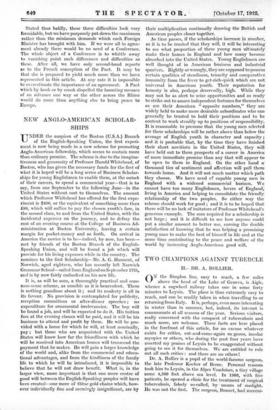NEW ANGLO-AMERICAN SCHOLAR- U NDER the auspices of the Boston (U.S.A.)
Branch of the English-Speaking Union, the first experi- ment is now- being made in a new scheme for promoting Anglo-American fellowship, which seems to contain more than ordinary promise. The scheme is due to the imagina- tiveness and generosity of Professor Harold Whitehead, of Boston, who has given the necessary funds for the first of what it is hoped will be a long series of Business Scholar- ships for young Englishmen to enable them, at the outset of their careers, to spend a commercial year—that is to say, from one September to the following June—in the United States without .cost to themselves. The amount which Professor Whitehead has offered for the first expe- riment is $400, or the equivalent of something more than £80, which will suffice to pay the chosen youth's fare, in the second class, to and from the United States, with the incidental expenses on the journey, and to defray the cost of an evening course at the College of Business Ad- ministration at Boston University, leaving a certain margin for pocket-money and so forth. On arrival in America the novice is to be—indeed, by now, has been— met by friends of the Boston Branch of the English- Speaking Union, and will be found a job which will provide for his living expenses while in the country. The nominee to the first Scholarship—Mr. A. G. Hannent, of Norwich, aged eighteen, who has recently left Norwich Grammar School—sailed from England on September 17th, and is by now fairly embarked on his new life, It is, as will be seen, a thoroughly practical and com- mon-sense scheme, as sensible as it is benevolent. There is nothing grandiose about it ; and its modesty is all in its favour. No provision is contemplated for publicity, reception committees or after-dinner speeches ; no expenditure for ornamental irrelevancies. The boy will be found a job, and will be expected to do it. His tuition fees at the evening classes will be paid, and it will be his business to attend and profit by them. He will be pro- vided with a home for which he will, at least nominally, pay ; but those who are acquainted with the United States will know how far the friendliness with which he will be received into American homes will transcend the payment that he makes. He will gain a larger knowledge of the world and, alike from the commercial and educa- tional advantages, and from the kindliness of the family life to which he will be introduced, it is impossible to believe that he will not draw benefit. What is, in the larger view, more important is that one more centre of good will between the English-Speaking peoples-will have been created—one more of thbse gold chains which, how- ever individually fine and seemingly insignificant, are by their multiplication continually drawing the British and American peoples closer together. As time passes, if the scholarships increase in number, as it is to be trusted that they will, it will be interesting to see what proportion of these young men ultimately make their homes in England and how many become absorbed into the United States. Young Englishmen are well thought of in American business and industrial quarters. Rightly or wrongly, they are supposed to possess certain qualities of steadiness, tenacity and comparative immunity from the fever to get-rich-quick which are not universal in American youth. Their reputation for honesty is also, perhaps deservedly, high. While they may not be as alert to seize opportunities and as ready to strike out to amass independent fortunes for themselves as are their American " opposite numbers," they are widely held to make more desirable subordinates who can generally be trusted to hold their positions and to be content to work steadily up to positions of responsibility. It is reasonable to presume that the young men selected for these scholarships will be rather above than below the average of English youth in character and capacity ; and it is probable that, by the time they have finished their short novitiate in the United States, they will have held out to them prospects of a career in America of more immediate promise than any that will appear to be open to them in England. On the other hand a' thousand ties of sentiment and affection will pull them towards home. And it will not much matter which path they choose. We have need of capable young men in England - with a widened commercial horizon. We cannot have too many Englishmen, lovers of England; living in America and helping to consolidate the friendly relationship of the two peoples. So either way the scheme should work for good ; and it is to be hoped that there will be no lack of imitators of Professor Whitehead's generous example. The sum required for a scholarship is not large ; and it is difficult to see how anyone could, put a similar amount to better use, earning the double satisfaction of knowing that he was helping a promising young man to make the best of himself in life and at the same time contributing to the peace and welfare of the world by increasing Anglo-American good will.


















































 Previous page
Previous page